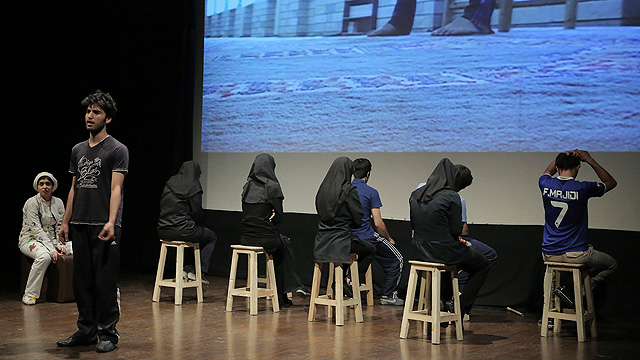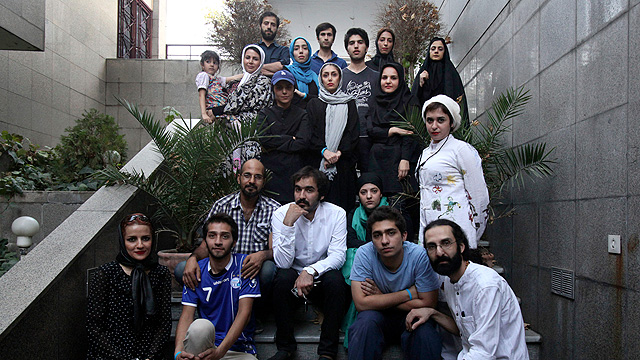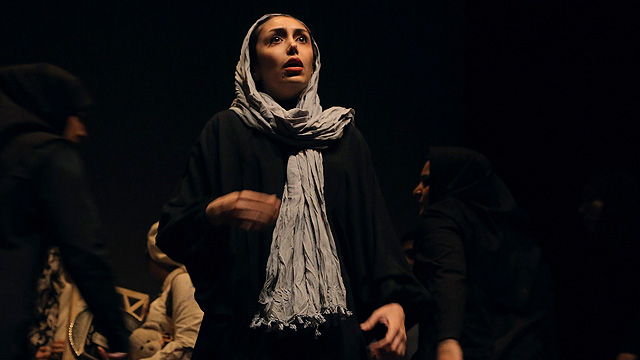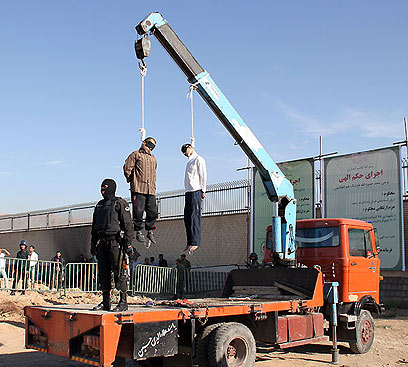
Edgy new play spotlights death row teens in Iran
Production titled 'The Blue Feeling of Death' tells true stories of seven juvenile death row inmates; audience sobs. Director hopes to raise funds to fight death sentences to minors, affect victims' families who have power to spare prisoners' lives
The curtain opens. Six nooses hang above a group of teenage inmates, who are making chairs in a prison workshop to be used as platforms in their own hangings. The audience gasps.
This is theater that's raw, edgy and political — and it's all been cleared by the Iranian authorities, even though they have tightened controls on speech.
Related stories:
- China tops capital punishment report for 2012
- Condemned Iranian weeps on hangman's shoulder
- Hamas executes 2 Palestinians convicted of espionage
The production, translated from Farsi as "The Blue Feeling of Death," opened last month as a showcase of activist art against Iran's legal codes that allow death sentences for juvenile offenders — who then wait until their 18th birthday for execution.
Opening night came even as Iranian officials tightened controls on social media and other forms of political opposition ahead of last month's presidential elections, whose centrist winner, Hassan Rohani, has brought hope of reversing some of the crackdowns.
The play tells the true stories of seven juvenile death row inmates and the families on all sides of their crimes. It also seeks to raise funds for defense lawyers and social workers trying to overturn death sentences on young people through Iran's system that allows families of victims to spare the life of the prisoner.
"Through the stage, we can affect many people — even the families of victims," said the play's director, Amin Miri, following a recent performance. "We are trying to give greater courage."
The play also shows the unpredictable enforcement of Iran's cultural overseers.

'Play could awaken public opinion' (Photo: AP)
Dozens of journalists, filmmakers and others have been arrested or fled the country in recent years over allegations of opposing Iran's Islamic establishment or stirring political dissent. These red lines still exist, but officials can give their nod to works exploring social issues or other topics that don't directly target the ruling clerics.
In 2008, a documentary filmmaker had permission to research Iran's rising number of sex-change operations, which have been legal under a religious edict, or fatwa, issued shortly after the 1979 Islamic Revolution.
The 2012 Oscar-winning film, "A Separation," by Asghar Farhadi, was hailed by Iranian authorities even though its plot is a harsh commentary on Iranian society through the viewpoint of a collapsing marriage. In 2003, Farhadi directed "Shahr-e Ziba," named after the neighborhood where the Tehran Correction Center is located, to portray the destinies of young convicts as well as the families of victims.
Still, last year Iranian officials ordered the closure of the House of Cinema, an independent film group that had operated for 20 years and counted Iran's top filmmakers, including Farhadi, among its members. The site has remained closed because of hard-line pressure despite a ruling to allow its reopening.
"Blue Feeling" has been able to walk the line between criticizing the legal codes that allow death sentences for young people — a practice condemned by Amnesty International and other rights groups — and showing that there are options in Iran's system for mercy.

The cast (Photo: AP)
Once a death sentence is imposed in a murder case, the victim's family can withdraw the punishment in place of jail time — and often payments known in the Islamic world as "blood money."
Eighteen death row inmates — some as young as 15 — were interviewed to build the play's story line, director Miri said. He was inspired to explore the issue by a move by some judges to postpone carrying out the hangings of inmates once they reached 18 in hopes of persuading victims' families to withdraw the punishment.
Among the stories in production is that of two young girls sentenced to death for killing their father when they were 12 and 15. Their fate — execution or imprisonment — is in the hands of an uncle, aunt and their grandmother.
"I felt as if I was communicating the message of the play when I heard and saw the reactions from the audience," said Mina Karimi Jebeli, who plays one of the young murderers.
At a recent performance at the Arasbaran Cultural Center in north Tehran, some of the theatergoers sobbed.

On stage. 'It was very emotional' (Photo: AP)
"It was very emotional," said 23-year-old Arezou Ziaei. "I cannot believe that such people are waiting for death."
Executions in Iran are increasingly carried out in prison gallows — often with a chair or bench kicked out from under the inmate — but public hangings still occur, with the condemned prisoner hoisted up by a crane attached to a rope and noose.
In the past, the age of criminal responsibility in Iran was defined by "maturity," — 9 for girls and 15 for boys. Iran's parliament, however, amended laws in 2011 to block death sentences on anyone under 15 and give judges more leeway to impose substitute sentences on juveniles convicted of murder.
While the number of juveniles sentenced to death in Iran is relatively small, rights group say it violates international treaties on treatment of young suspects.

Hanging in Iran
In January, a 21-year-old Iranian man was executed for his alleged role in a murder committed when he was 17, activist groups say. In 2012, at least one of the more than 300 people executed in Iran had been sentenced as a juvenile.
Two other countries, Saudi Arabia and Sudan, are known to have executed someone in recent years for a crime committed before they were 18, according to New York-based Human Rights Watch. Last September, Ahmed Shaheed, the UN special rapporteur on Iran, urged Iranian authorities to abolish capital punishment in juvenile cases.
A lawyer, Nemat Ahmadi, welcomed the performance as a chance to push lawmakers and authorities to contemplate further judicial reforms.
"Such a play," he said, "is able to awaken public opinion."
- Receive Ynetnews updates directly to your desktop










